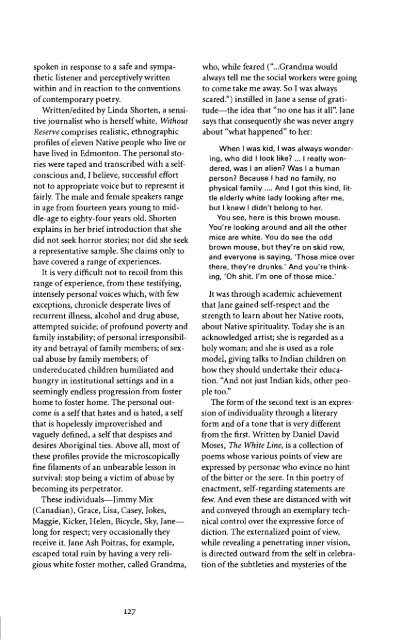The Carpathians - University of British Columbia
The Carpathians - University of British Columbia
The Carpathians - University of British Columbia
You also want an ePaper? Increase the reach of your titles
YUMPU automatically turns print PDFs into web optimized ePapers that Google loves.
spoken in response to a safe and sympathetic<br />
listener and perceptively written<br />
within and in reaction to the conventions<br />
<strong>of</strong> contemporary poetry.<br />
Written/edited by Linda Shorten, a sensitive<br />
journalist who is herself white, Without<br />
Reserve comprises realistic, ethnographic<br />
pr<strong>of</strong>iles <strong>of</strong> eleven Native people who live or<br />
have lived in Edmonton. <strong>The</strong> personal stories<br />
were taped and transcribed with a selfconscious<br />
and, I believe, successful effort<br />
not to appropriate voice but to represent it<br />
fairly. <strong>The</strong> male and female speakers range<br />
in age from fourteen years young to middle-age<br />
to eighty-four years old. Shorten<br />
explains in her brief introduction that she<br />
did not seek horror stories; nor did she seek<br />
a representative sample. She claims only to<br />
have covered a range <strong>of</strong> experiences.<br />
It is very difficult not to recoil from this<br />
range <strong>of</strong> experience, from these testifying,<br />
intensely personal voices which, with few<br />
exceptions, chronicle desperate lives <strong>of</strong><br />
recurrent illness, alcohol and drug abuse,<br />
attempted suicide; <strong>of</strong> pr<strong>of</strong>ound poverty and<br />
family instability; <strong>of</strong> personal irresponsibility<br />
and betrayal <strong>of</strong> family members; <strong>of</strong> sexual<br />
abuse by family members; <strong>of</strong><br />
undereducated children humiliated and<br />
hungry in institutional settings and in a<br />
seemingly endless progression from foster<br />
home to foster home. <strong>The</strong> personal outcome<br />
is a self that hates and is hated, a self<br />
that is hopelessly improverished and<br />
vaguely defined, a self that despises and<br />
desires Aboriginal ties. Above all, most <strong>of</strong><br />
these pr<strong>of</strong>iles provide the microscopically<br />
fine filaments <strong>of</strong> an unbearable lesson in<br />
survival: stop being a victim <strong>of</strong> abuse by<br />
becoming its perpetrator.<br />
<strong>The</strong>se individuals—Jimmy Mix<br />
(Canadian), Grace, Lisa, Casey, Jokes,<br />
Maggie, Kicker, Helen, Bicycle, Sky, Jane—<br />
long for respect; very occasionally they<br />
receive it. Jane Ash Poitras, for example,<br />
escaped total ruin by having a very religious<br />
white foster mother, called Grandma,<br />
who, while feared ("...Grandma would<br />
always tell me the social workers were going<br />
to come take me away. So I was always<br />
scared.") instilled in Jane a sense <strong>of</strong> gratitude—the<br />
idea that "no one has it all". Jane<br />
says that consequently she was never angry<br />
about "what happened" to her:<br />
When I was kid, I was always wondering,<br />
who did I look like? ... I really wondered,<br />
was I an alien? Was I a human<br />
person? Because I had no family, no<br />
physical family .... And I got this kind, little<br />
elderly white lady looking after me,<br />
but I knew I didn't belong to her.<br />
You see, here is this brown mouse.<br />
You're looking around and all the other<br />
mice are white. You do see the odd<br />
brown mouse, but they're on skid row,<br />
and everyone is saying, 'Those mice over<br />
there, they're drunks.' And you're thinking,<br />
'Oh shit. I'm one <strong>of</strong> those mice.'<br />
It was through academic achievement<br />
that Jane gained self-respect and the<br />
strength to learn about her Native roots,<br />
about Native spirituality. Today she is an<br />
acknowledged artist; she is regarded as a<br />
holy woman; and she is used as a role<br />
model, giving talks to Indian children on<br />
how they should undertake their education.<br />
"And not just Indian kids, other people<br />
too."<br />
<strong>The</strong> form <strong>of</strong> the second text is an expression<br />
<strong>of</strong> individuality through a literary<br />
form and <strong>of</strong> a tone that is very different<br />
from the first. Written by Daniel David<br />
Moses, <strong>The</strong> White Line, is a collection <strong>of</strong><br />
poems whose various points <strong>of</strong> view are<br />
expressed by personae who evince no hint<br />
<strong>of</strong> the bitter or the sere. In this poetry <strong>of</strong><br />
enactment, self-regarding statements are<br />
few. And even these are distanced with wit<br />
and conveyed through an exemplary technical<br />
control over the expressive force <strong>of</strong><br />
diction. <strong>The</strong> externalized point <strong>of</strong> view,<br />
while revealing a penetrating inner vision,<br />
is directed outward from the self in celebration<br />
<strong>of</strong> the subtleties and mysteries <strong>of</strong> the

















